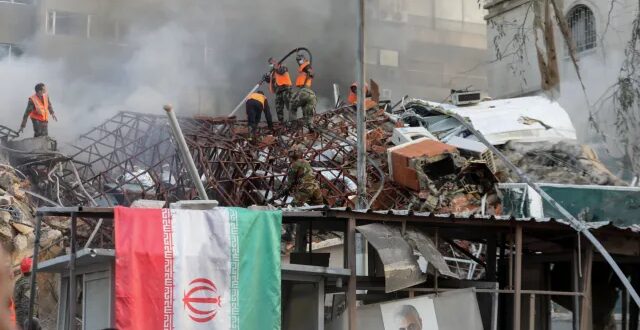Israel has been building up its assets in Syria, says a former CIA agent
The suspected assassination of an Iranian commander by an Israeli air strike at the Iranian consulate in Damascus would have required on-the-ground intelligence from local operatives, according to an Israeli security analyst and a former CIA agent.
Mohammad Reza Zahedi was killed along with several other senior military officials and diplomats by long-range missiles fired from F-35 fighter jets, Iranian officials said, promising harsh reprisals against presumed perpetrator Israel.
Israel had no comment on the incident in line with a longstanding policy of ambiguity around strikes in Syria, where it is thought to have carried out numerous attacks on Iranian and Hezbollah targets.
The New York Times reported that Israel was responsible for the Damascus attack, citing official military sources, who denied that the building had protected diplomatic status.
Yoni Ben Menachem, an Israeli security analyst with close ties to the defence establishment, said the operation appeared to have relied on local informants.
“I think it was accurate information from operatives on the ground who made sure that this guy was in the building, and then the green light was given to the planes to hit the building with rockets,” he said.
“We don’t rely only on electronics before we assassinate someone — we make sure that he is in the right place and that some operative sees him personally to make sure there’s no mistake”.
Ken Katzman, a former CIA analyst with a focus on the Middle East now at The Soufan Group think-tank, agreed that sources in Syria would have been essential.
“Israel has been gathering intelligence as to where Iran’s commanders are… They have got confederates and various assets inside Damascus,” he said. “This is not something that would have been dreamed up yesterday, it takes a lot of planning to know what hours these guys are in. That’s a long-term project”.
Mr Katzman said the strike on a consulate building did not mark a new approach by Israel but “a fairly significant escalation” of previous practice.
Israel has been striking Iranian targets across the Middle East for years, he said, but Zahedi is among the most senior officials to have been killed. Attacking a consulate is also new territory.
The strike follows the killing of another Iranian commander, Seyed Radhi Mousavi, in a suspected Israeli attack in Syria in December — part of a surge in apparent assassinations of Iranian military officials during the war in Gaza.
Israel’s Defence Minister, Yoav Gallant, warned yesterday that Israel was ready to “act everywhere, every day, to prevent the build-up of our enemies”, signalling willingness to strike across the region.
Mr Katzman suggests that the strike may have been partly intended to create insecurity among Iranian and allied leaders, as they fret over who might be next.
 Eurasia Press & News
Eurasia Press & News



